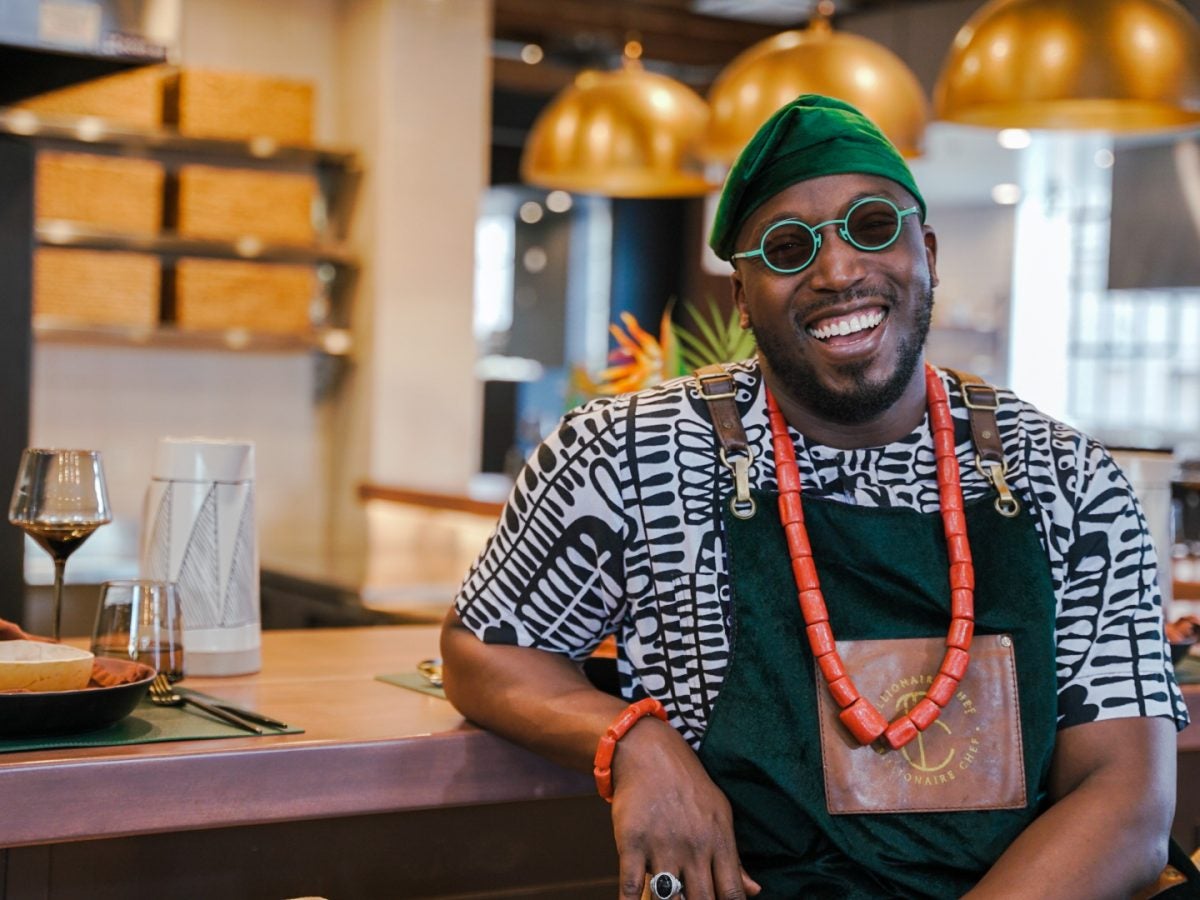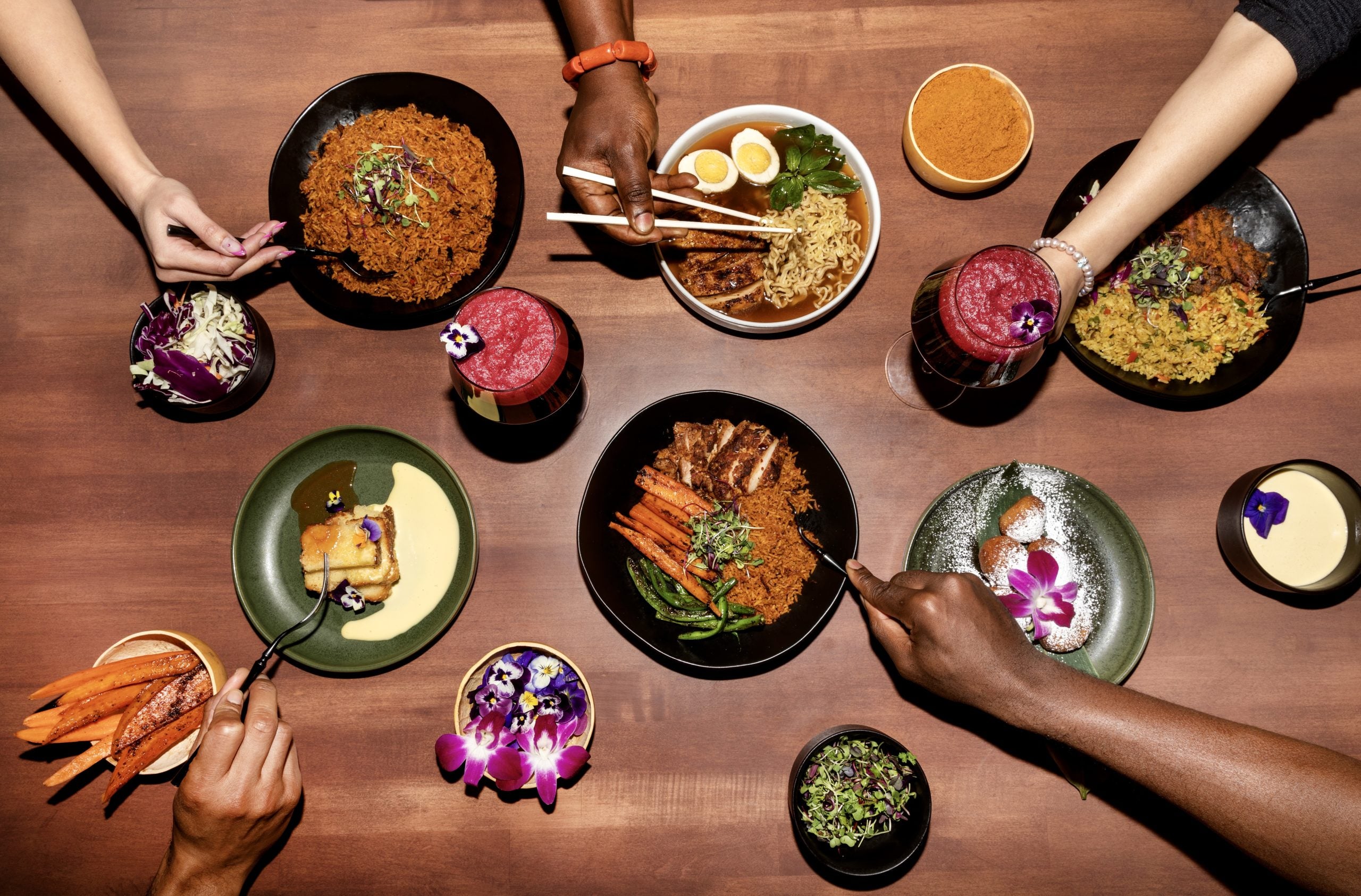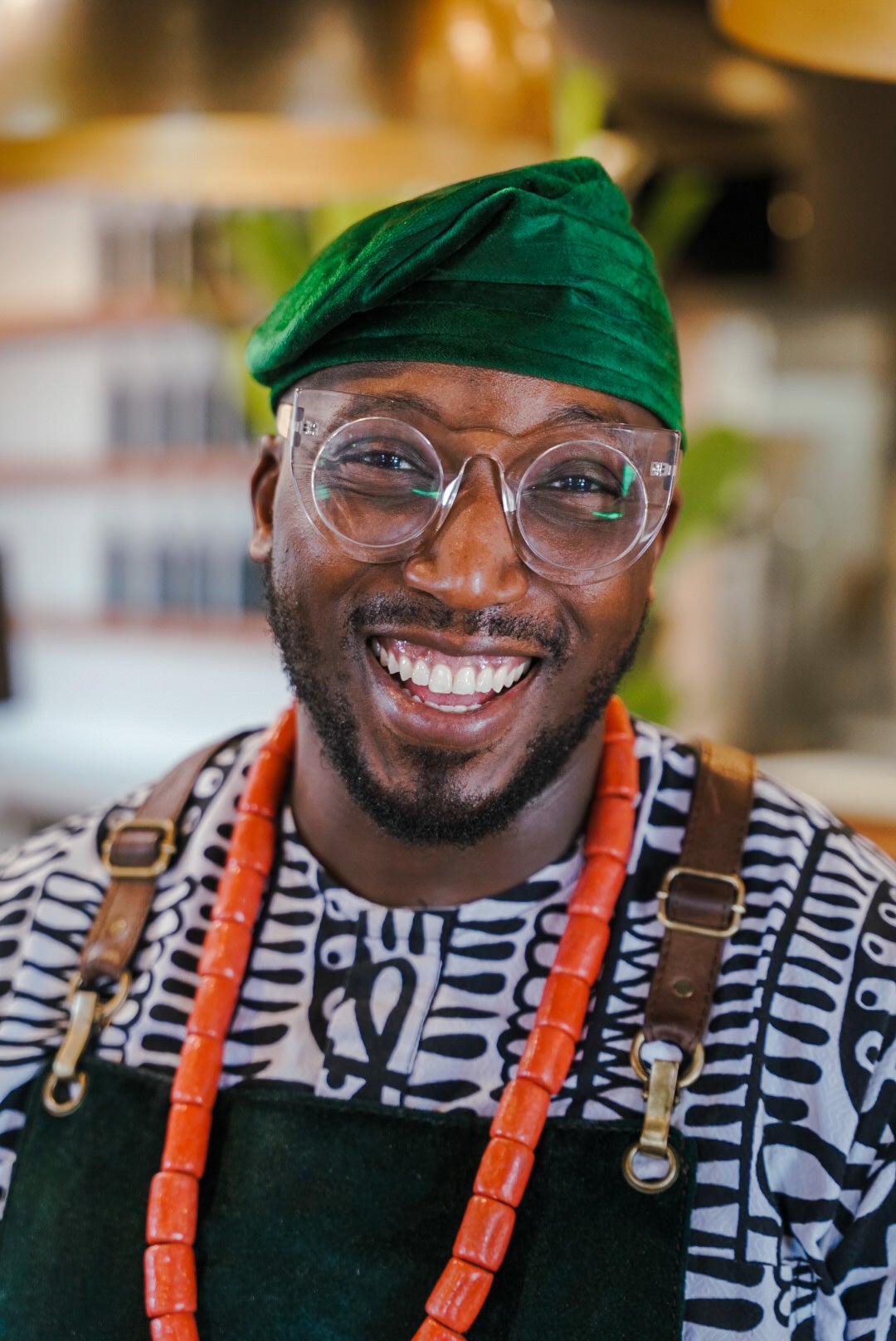
Hailing from Benin City and Lagos, Nigeria, Tolu Erogbogbo, or Chef Tolu Eros has made it his life’s undertaking to share West African fare in his new home in the United States and make its flavors widely known (and loved). He is more familiarly regarded as Chef Eros, the culinary hometown hero who used to fly with a suitcase bearing an overflowing load of Nigerian spices. Those priceless ingredients were imported to make balanced jollof rice, umami — which included umilo or coconut plum seeds, pepper soup additives and more. Eros believes these special components are native to the regions, locales, and soils of Nigeria for a reason, so why try to find alternatives when the perfect flavor materials already exist?
Before he dived deep into gastronomy, Erogbogbo obtained an international business degree from the University of Wolverhampton in the United Kingdom where he became adept at how to build a business from the ground up and learned more about worldwide cuisine. Shortly after, he opened a trio of eateries (ILÉ Eros, The Cookie Jar, Eros & Gourmet) in Nigeria, where his reputation and business-minded curiosity began to grow beyond the borders of his motherland. In Yoruba, “ILÉ” translates to home and the epicure’s main goal is to bring that sense of comfort to new, less informed consumers.
“In Lagos, I started hosting dinner parties for friends and friends of friends as a way to bring people together and share stories over a meal,” Eros tells ESSENCE. European royals, Nigerian celebrities, and local debutantes would follow, showing face at Chef Eros’s businesses. This is when he started to host private, more intimate dinners for those looking for a sort of Nigerian “Omakase” experience. “Each dinner was filled with so much love and eventually word began to spread and private dinners for clientele like French President Emmanuel Macron and Nobel Prize-winning author Wole Soyinka [were organized],” says Eros. I got the tongue and cheek moniker ‘The Billionaire’s Chef’ and went with it.”
In March, the executive chef and founder of ILÉ in Nigeria opened up a West African bistro in Los Angeles and an experiential dining restaurant all under the same name. Eros spoke with ESSENCE about these new ventures as well as being the first West African chef to serve multi-course plates at the Coachella music festival as a part of their Outstanding in the Field culinary programming.

ESSENCE: I would love to hear more about your story. In the past, you literally were carrying suitcases full of authentic spices from Lagos to bring to the U.S. for new customers to try. What made you fall in love with the culinary world?
Chef Tolu Eros: I was born and raised in Nigeria and at the young age of 13, I developed a love for entrepreneurship after I started my first business selling snacks to classmates. Then while studying international business, I uncovered my passion for food. This was the first time I was away from home and I missed the food and people I grew up with, so I would call my mother and grandmother to teach me how to cook the recipes I grew up eating. While in school, I took a job at a restaurant and I started a side business I called “Chicken Guy” where I sold marinated chicken.
I moved back to Nigeria after finishing school and opened a restaurant with my mom when I was 21. I gained a wealth of experience and decided then that I would pair my love of Nigerian food with my passion for entrepreneurship and knowledge of international business affairs to put West African cuisine on the global food map. I got to work growing my business in Lagos by opening The Cookie Jar, a bakery in Lagos, without any bakery experience. Much like my cooking, I’m completely self-taught. The bakery was a hit. I launched a catering company, Eros & Gourmet, in 2013, and in 2018, and I opened my second restaurant, ILÉ Eros, an authentic Nigerian restaurant with a modern twist. It quickly became a destination for tourists visiting Lagos to experience world-class Nigerian cuisine.
Your concept kitchen in Los Angeles, ILÉ, is home to so much love and care you put into providing a special, intimate experience that would introduce or reacquaint the flavors of your home country to consumers. Why was the pop-up restaurant your first idea for segueing into the American market?
Shortly after pandemic travel restrictions were lifted, I wanted to go everywhere – and I did! Along the way, I hosted dinner parties like I used to in Lagos in cities like Dubai, Paris, and New York. When I came to LA, it was supposed to be temporary, but I was immediately drawn to the city, people and energy. I knew early on that I wanted to stay longer, plant roots, and share my West African culture and cuisine with Angelenos and visitors. I opened up my home and started offering a couple tastings centered around a Chef’s Table, where guests are immersed into an intimate culinary experience while I share parts of my soul through food, music, storytelling and setting. The elevated tasting menus allowed me to introduce my concept to the LA market and set the foundation for my newest venture, ILÉ Bistro, which we opened in March at Citizen Public Market in Culver City.
What feels different when you are prepping food for your community in Lagos compared to serving dishes in California?
The two major differences between preparing food in Lagos versus California include familiarity and dietary restrictions. Most people in California have never tried Nigerian food or if they have, it’s been at home with their families. My menu is an introduction to West African food and culture and I approach this in a thoughtful way by incorporating ingredients that feel a bit familiar, like fresh seasonal produce from local farmers markets paired with spices imported from Africa. Additionally, in California there are a lot more dietary restrictions than there are back home, which has allowed me to be more creative to accommodate most dietary needs and offer an inclusive dining experience for everyone.
What food staple from your upbringing do you enjoy sharing with people most?
Hands down, it’s the pepper soup, which was inspired by my grandmother who would say, “Pepper soup has the ability to cure malaria and find you love at the same time.” She was referring to the blend of spices, the heat, and nourishing power of our soup, which is a staple in many West African households. The soup has been well received by all our guests who enjoy the complexity of flavors, the layers of ingredients, and the delicious aroma – there’s nothing else like it. Every time we cook pepper soup and serve it to our guests, it transports me back to my home and childhood.

How did the Coachella “Outstanding in the Field” experience come to be?
I’ve had my sights set on Coachella since touching down in Los Angeles and spoke it to existence. My goal is to put Nigerian food on the global map and what better way to do this than by showcasing my menu at Coachella, one of the biggest music festivals in America? Last year, some friends and I got invited to attend a Soho House event at Coachella. From there, we met some amazing people, including the team behind Outstanding in the Field. I expressed interest in participating in their upcoming 2023 dinner and my desire to make West African cuisine global. I invited them to ILÉ LA to experience the private dining room firsthand and it was during that dinner that I got the email confirming my participation in Outstanding in the Field at Coachella.
What keeps you so inspired to bring Nigerian fare to global events?
With every milestone achieved, the journey feels right and like we are headed in the right direction. My team and those who reach out to me via DMs, comments, etc. who tell me what I’m doing is inspiring them or filling them with pride to see their culture getting long-overdue recognition. It’s a privilege to touch people’s lives through food and let them know they are seen and loved.
Why do you feel West African cuisine is so special and needs to be spotlighted more?
Up until recently, West African cuisine hasn’t been celebrated or understood by an international audience, but now is our moment to shine and get the recognition we deserve. West African flavors are nourishing and robust. It takes hours and sometimes multiple days to prepare our dishes. That’s a lot of love, effort and flavor that goes into one dish. West African cuisine is one of the world’s most influential food cultures that dates back thousands of years. To eat our food is to honor our history.